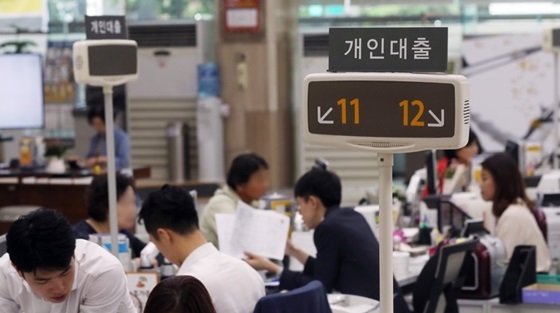South Korean households are becoming less able to repay their debts in terms of their income amid a rate hike trend, a central bank report showed Thursday.
The debt service ratio of household borrowers reached 38.8 percent in the second quarter, up 0.8 percentage point from six months earlier, according to the biannual report by the Bank of Korea submitted to parliament.
 |
(Yonhap) |
The DSR refers to the ratio of a family's total debt payments -- principal and interest -- to its annual income, designed to check the borrower's ability to pay off.
The number has been rising steadily since 2013, when it was 34 percent.
But the households' debt to asset ratio has remained stable over the past decade, moving in a range of 14-18 percent since 2008.
"It means that South Korean households have enough assets to repay their debts. But in terms of income, their debt repayment ability is decreasing," said the BOK report.
South Korea's household credit, which surpassed 1,500 trillion won ($1.33 trillion) as of the end of September, has been on a record-breaking increase for nearly four years thanks to government-led economic growth boosting measures and accommodative monetary policy.
The growth pace of household debt has been slowing down to some extent on a series of anti-speculation measures by the Moon Jae-in government, which took office in May last year.
Moreover, the central bank started the monetary tightening to lift the policy rate two times over the last 13 months to 1.75 percent.
"Still, household debt rose at a faster pace than that of income," the BOK report said. "A possible contraction in their earnings and further hikes in lending rates will weigh more heavily on borrowers."
Meanwhile, the BOK said the recent anti-speculation measures, enacted in mid-September to curb household debt and cool the overheated housing market, have led to a drop of some 5 to 6 trillion won in the total value of new mortgage loans in the third quarter.
The latest regulative package is aimed at keeping owners of multiple homes from buying additional residences in heated regions, like Seoul, and imposing higher taxes on expensive property transactions. (Yonhap)





![[Herald Interview] 'Trump will use tariffs as first line of defense for American manufacturing'](http://res.heraldm.com/phpwas/restmb_idxmake.php?idx=644&simg=/content/image/2024/11/26/20241126050017_0.jpg)


![[Herald Review] 'Gangnam B-Side' combines social realism with masterful suspense, performance](http://res.heraldm.com/phpwas/restmb_idxmake.php?idx=644&simg=/content/image/2024/11/25/20241125050072_0.jpg)